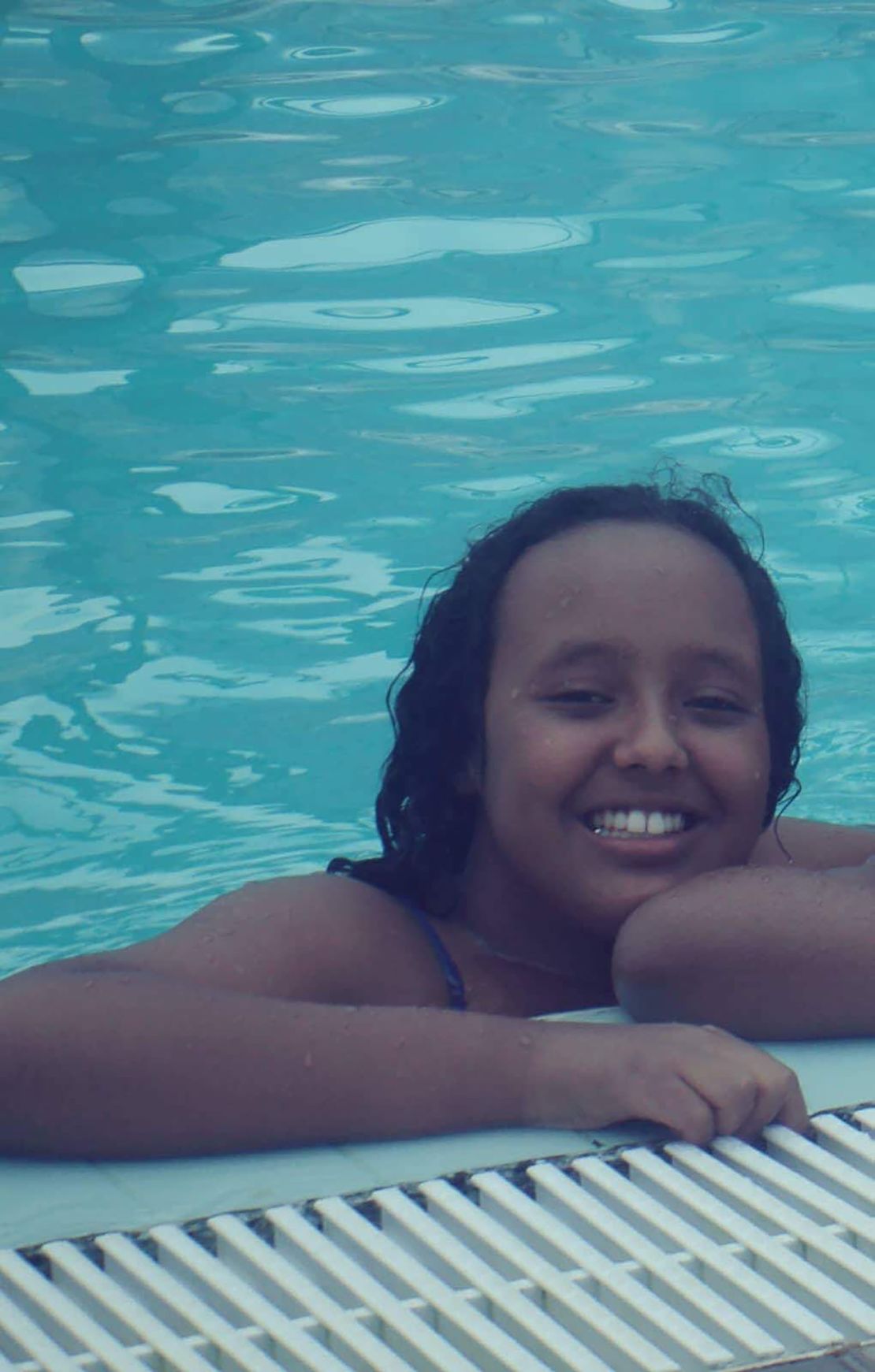With her fresh face and bright, hopeful smile, Ciham Ali Ahmed looks just like any other ninth-grader.
But Ali Ahmed was imprisoned at 15 years old. Now, six years later, her family says they don’t know where she is or what has happened to her since she was detained by Eritrean security forces while trying to leave the country.
The Eritrean-American citizen has never been charged or convicted of any crime, yet it’s believed she’s been languishing in an Eritrean prison since December 2012.
April 3 is her birthday and, as she turns 22, Human Rights Watch has called on the Eritrean government to free her and other political prisoners held in the country.
“By holding [Ali Ahmed] incommunicado from the age of 15, the government has effectively disappeared her,” Felix Horne, senior Africa researcher at the rights group, said in a statement.
“The release of Ciham and all of Eritrea’s political prisoners would send a clear message to the international community that the country’s leaders are embarking on a new path of increased respect for human rights,” he added.
Campaigners from the Eritrean diaspora such as “One Day Seyoum” have launched a social media campaign using the hashtag #happybirthdayciham. to draw attention to Ali Ahmed’s story.
Her uncle, Saleh Younis told CNN in 2018 that his niece – a dual US and Eritrean national born in Los Angeles to Eritrean parents – was trying to leave the country because of Eritrea’s policy of forced national military service for young people beginning at age 18.
Eritrea, often described as the “North Korea of Africa,” has never had a national election; there is no free press and citizens are not allowed to leave without an exit visa issued by the government.
Forced national military service, which is supposed to last 18 months, can last indefinitely.

A Human Rights Watch report from 2017 stated that “physical abuse, including torture” occurs frequently for people taking part in national service. “…so does forced domestic servitude and sexual violence by commanders against female conscripts,” it adds.
Young people in Eritrea are faced with either a lengthy conscription or embarking on perilous journeys out of the country to reach Europe.
“Everyone her age group tries to escape because of the military conscription,” Younis, who is based in the US and edits an opposition Eritrean news website, explains.
“It’s not like you’re going in to serve and then in the 18 months, you are out. You go in and then you may never come out.
And that’s why they leave in their tens of thousands,” he says.
There were 459,430 Eritrean refugees around the world by the end of 2016, according to the UN refugee agency, UNHCR.
Since Ali Ahmed’s 2012 arrest, her family has made desperate attempts to find out what happened to her.

Ali Ahmed is the daughter of the country’s former minister of information, once a key member of President Isaias Afwerki’s Cabinet. He fled the country in 2012 fearing for his life as the President’s rule became increasingly autocratic.
Her parents, Ali Abdu and Tsigereda Tsae’da, were part of the country’s liberation force and helped to fight for Eritrea’s independence in 1993, which is where they met and later married, according to Younis, who is Ali Abdu’s brother.
Ali Ahmed’s father now lives in exile in Australia. His wife and younger disabled son earlier fled to Canada because they feared for their lives, where they now live under new identities, according to an affidavit Ali Abdu wrote.
He wrote in the affidavit that he tried to negotiate to get his daughter out of Eritrea after he had fled when he found out his life was in danger. He said he feared she would face a life of permanent conscription if she remained in the country.

While they have not previously made any public statements about their daughter, Ali Ahmed’s parents described their memories of her in a statement given to Younis.
“Ciham was always smiling and loved to surprise people by giving gifts,” they wrote.
“She was so caring and compassionate, especially when she sees poor people. For example, she was giving her school lunch for one year to the beggar who was seating at the doorstep of the school. Her dream was to be a world-renowned designer,” the statement added.
They write that their daughter loved reggae music and was a great swimmer who loved to paint and spoke fluent English and Italian.
Shortly after Ali Abdu fled Eritrea, his 87-year-old father, Abdu Ahmed Younis, was arrested and put in prison for five years. He died months after his release, according to Younis.
It was not the first time he was detained by authorities. A 2004 Amnesty International report stated that the elder Younis was held in late 2001 for attempting to mediate between dissidents and the President.
Ali Abdu’s younger brother Hassen Abdu Ahmed was also detained at the Sembel prison, where visitation rights are allowed, Younis said.
Only Ali Ahmed’s whereabouts are still a mystery.
“Every time we have tried to find out where she is. The consistent message is: her case is being personally handled by the President and nobody knows anything about it. She just disappeared,” Younis says.
“The only thing one can speculate is that it’s some form of punishment to her father.”
Younis has called on the US government to do more to help secure his niece’s release.
“Because she is US born… I really thought the government of the United States would scream bloody murder but no one is speaking for her. It’s very, very disappointing. She is a United States citizen but because she grew up in Eritrea and because her parents are Eritreans, then I guess she is not fully American,” he says.

Violeta Talandis, a spokeswoman for the US Embassy in Asmara, told CNN in an emailed statement that they are aware of her case.
“We are aware of reports of a US citizen detained in Eritrea. One of the most important tasks of the Department of State and US embassies and consulates abroad is to provide assistance to US citizens who are incarcerated or detained abroad. Due to privacy considerations, we have no further comment,” the statement read.
Younis says US representative for New Jersey’s 4th Congressional District, Chris Smith, who chairs the US House Foreign Affairs Subcommittee on Africa, Global Health, Global Human Rights and International Organizations, has been sympathetic and mentioned Ali Ahmed’s case at a hearing in Congress after a fact-finding mission to Ethiopia this year.
CNN has reached out to Congressman Smith for comment but has not yet received a response.
Eric Whitaker, a former charge d’affairs at the US Embassy in Asmara, Eritrea’s capital, told the Voice of America in 2016 that the US had repeatedly asked for consular access with no success.
“We are concerned regarding the case,” he said, according to the VOA. “The answers we get are typically vague or note that such an individual is an Eritrean citizen.”
Ali Ahmed is one of tens of thousands of prisoners who are arrested and never heard from again. A 2013 Amnesty report states that the country’s prisons are “filled with thousands of political prisoners who are locked up in atrocious conditions without ever being charged with a crime. Many prisoners are never heard from again after being taken into custody.”
Gaim Kibreab, professor of refugee studies at London’s South Bank University and an expert on forced migration in Eritrea, says it is “typical of President Afwerki’s style.”
“There is no court of law. In Eritrea, you are guilty until proven innocent. The human rights situation is appalling,” Kibreab said.
“She is in hell. Conditions in Eritrean prisons are overcrowded. There is no adequate food or clothing. They are treated like they are not human beings,” he added.
CNN has contacted Eritrea’s Information Minister Yemane Ghebremeskel for comment but has not received a response.
Kibreab says it is hard for the international community to pressure Eritrea into releasing Ali Ahmed or any other prisoner.
“They have no leverage with Eritrea,” he says. “The country is empty, the economy has collapsed and it is isolated.”
Despite fresh hopes of change after Ethiopia and Eritrea signed a peace deal in July, ending decades-long hostilities between the two countries, Kibreab is cautious.
“There has been no change whatsoever in Eritrea since the peace agreement,” says Kibreab.
“But Eritrea is an unpredictable place, so I am hopeful that one day change will come.”






